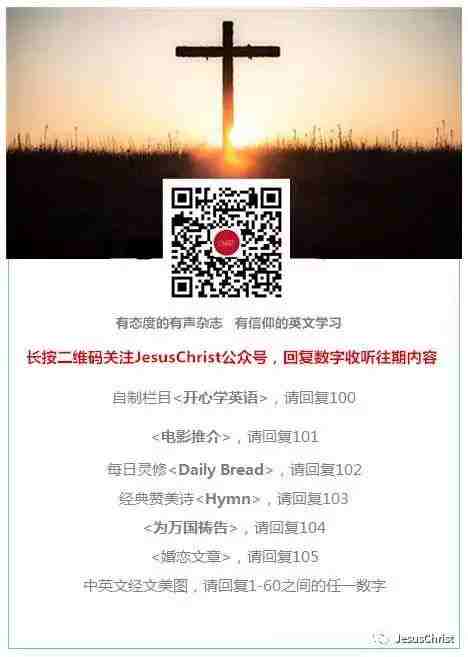开心学英语 | 一粒麦子 A Kernel of Wheat


弟兄姊妹们主内平安,今天我们分享的经文来自新约约翰福音(John12:20-26)
Now there were some Greeks among those who went up to worship at the Feast. They came to Philip, who was from Bethsaida in Galilee, with a request. "Sir," they said, "we would like to see Jesus." Philip went to tell Andrew; Andrew and Philip in turn told Jesus. Jesus replied, "The hour has come for the Son of Man to be glorified. I tell you the truth, unless a kernel of wheat falls to the ground and dies, it remains only a single seed. But if it dies, it produces many seeds. The man who loves his life will lose it, while the man who hates his life in this world will keep it for eternal life. Whoever serves me must follow me; and where I am, my servant also will be. My Father will honor the one who serves me.
那时,上来过节礼拜的人中,有几个希腊人。他们来见加利利伯赛大的腓力,求他说:“先生,我们愿意见耶稣。”腓力去告诉安得烈,安得烈同腓力去告诉耶稣。耶稣说:“人子得荣耀的时候到了。我实实在在地告诉你们:一粒麦子不落在地里死了,仍旧是一粒;若是死了,就结出许多子粒来。爱惜自己生命的,就失丧生命;在这世上恨恶自己生命的,就要保守生命到永生。若有人服侍我,就当跟从我;我在哪里,服侍我的人也要在那里;若有人服侍我,我父必尊重他。”


1、Now there were some Greeks among those who went up to worship at the Feast.
Greek英 [gri:k] n.希腊人(名词复数Greeks );希腊语;
Greek,也作形容词,希腊语的;希腊的,希腊人的
went up to 到什么地方去;went是go的过去式
Feast 英 [fiːst] 宴会;酒席;节会
2、I tell you the truth, unless a kernel of wheat falls to the ground and dies, it remains only a single seed.
unless英 [ən'les] conj.除非,如果不
kernel 英 ['kɜːnl] n.核心;仁;
wheat英 [wiːt] n.小麦;wheat的基本意思是“小麦”,可指草本植物的小麦,也可指小麦的籽实,是不可数名词。一粒麦子可以说a kernel of wheat 或者a grain of wheat
falls英 [fɔːl] v.落下;倒下;来临( fall的第三人称单数 )
single英 ['sɪŋgl] adj.单一的;惟一的;

我们一起看一下语法
1、 They came to Philip, who was from Bethsaida in Galilee, with a request. "Sir," they said, "we would like to see Jesus."
would like想要,愿意
(1.1)后接名词或代词,表示具体"要"某样东西
e.g.I would like a cup of coffee.
我要一杯咖啡。
I would like a large bowl of noodles.
我想要一个大碗的面条。
(1.2)后接动词不定式(就是to do形式),表示意愿、喜爱,常用于有礼貌地提出邀请、请求或建议。
e.g.I would like to help you.
我愿意帮你。
I would like to have some ham and eggs.
我想要一些火腿和鸡蛋。
(1.3)would like sb. to do sth.
想要某人做某事。
e.g.I'd like you to meet them.
我想要你见他们。
I'd like him to do my homework.
我想让他做我的家庭作业。
(1.4)Would you like...?你(们)想要…吗?表示向对方提出客气的、有礼貌的请求、邀请、希望或询问等。
e.g. Would you like an apple?
你想要个苹果吗?
注意:它的肯定回答多用Yes, please./Yes, I'd (We'd) like (love) to./Certainly./Yes, thank you.等;否定回答常用No, thanks./No, thank you.等。
e.g. -Would you like to drink some tea?
你要喝茶吗?
-Yes, thank you.
是的,谢谢。
-Would you like some coffee?
你要点儿咖啡吗?
-No, thanks.
不要了,谢谢。
2、I tell you the truth, unless a kernel of wheat falls to the ground and dies, it remains only a single seed.
(1)unless,用作连词(conj.), 除非;如果不
unless是从属连词,引导条件状语从句,含有否定意义,相当于if条件状语从句的否定形式。所以unless = if not。注意:unless引导的条件状语从句和if条件状语从句,与其它时间状语从句一样,用一般现在时代替将来时。
e.g. I won't go to the party unless I'm invited.
除非我被邀请,否则我不会去参加晚会的。
Unless you work harder, you will not pass the examination.
如果不加紧用功,你就不能通过考试。
You never play well unless you practice more.
你若不多加练习永远都弹不好。

最后我们再回顾一下这段经文

Now there were some Greeks among those who went up to worship at the Feast. They came to Philip, who was from Bethsaida in Galilee, with a request. "Sir," they said, "we would like to see Jesus." Philip went to tell Andrew; Andrew and Philip in turn told Jesus. Jesus replied, "The hour has come for the Son of Man to be glorified. I tell you the truth, unless a kernel of wheat falls to the ground and dies, it remains only a single seed. But if it dies, it produces many seeds. The man who loves his life will lose it, while the man who hates his life in this world will keep it for eternal life. Whoever serves me must follow me; and where I am, my servant also will be. My Father will honor the one who serves me.
圣经没告诉我们耶稣到底有没有见希利尼人,可是听到他们想见祂,就证明那是个极重要的时刻。祂回答说,人子得荣耀的时候到了。这句话是九个有关耶稣的“时候/时辰”经节(二4,七30,八20,十二23、27〔2x〕,十三1,十六32,十七1)中的第四个,它是第四卷福音书的一个重要主题。头三节经文都说耶稣的时辰尚未来到,这第四个经节则是第一个说到祂的时辰已到。引发这转变的是希腊人的来到。耶稣接下来说的话虽富有高度比喻性,可是表示了祂得荣耀的时刻是指何意:我实实在在的告诉你们,一粒麦子不落在地里死了,仍旧是一粒,若是死了,就结出许多子粒来。它主要是指耶稣的受死。当一粒麦子种在地里,“死了”,就会结出许多子粒来,且会成长茁壮。同样道理,当耶稣受死之后,祂引发的效应是许多人因相信祂就得到永生,有个属灵大丰收。希腊人想见祂,促发耶稣想到当祂受死后,会发生极大的收成(不仅在犹太人当中,也在万民万族中)。每件事情都是朝着这时刻发展,而那就是耶稣受死的时刻,继之而起的是祂的复活与升天。那时人子就得到荣耀。
耶稣的舍下性命给门徒立了一个榜样:爱惜自己生命的,就失丧生命,在这世上恨恶自己生命的,就要保守生命到永生。“爱惜”自己生命的人,就会尽量保存自己的生命和世上的一切,但却会失去永生。在福音书的相关经节中,耶稣提到生活在这世上的一些重要层面,包括爱父母、兄弟姊妹、妻子儿女,甚至生命本身,可是在跟随主耶稣的事上,这些都不能居门徒心中的首位(太十37-39;路十四25-27,十七33)。
耶稣将前几节所暗示的事在此节明说出来——祂的生命是所有服事祂的人的典范:若有人服事我,就当跟从我,亦即祂如何放下自己,他们为祂的缘故也要同样地放下自己。这种生活方式会得到两个应许:(1)我在哪里,服事我的人也要在哪里。凡效法耶稣在这世界放下自己的人,都会在祂将来的荣耀里占一席之地(十四2-3,十七24);(2)若有人服事我,我父必尊重他。耶稣的门徒在今世也许会像祂一样,遭到“世人”的唾弃,可是在世界末日时,他们会从最要紧的那一位得到尊重,并且惟有祂才能给人荣耀。耶稣应许说,凡服事祂的人都会得到神的尊重。

最新评论
推荐文章
作者最新文章
你可能感兴趣的文章
Copyright Disclaimer: The copyright of contents (including texts, images, videos and audios) posted above belong to the User who shared or the third-party website which the User shared from. If you found your copyright have been infringed, please send a DMCA takedown notice to [email protected]. For more detail of the source, please click on the button "Read Original Post" below. For other communications, please send to [email protected].
版权声明:以上内容为用户推荐收藏至CareerEngine平台,其内容(含文字、图片、视频、音频等)及知识版权均属用户或用户转发自的第三方网站,如涉嫌侵权,请通知[email protected]进行信息删除。如需查看信息来源,请点击“查看原文”。如需洽谈其它事宜,请联系[email protected]。
版权声明:以上内容为用户推荐收藏至CareerEngine平台,其内容(含文字、图片、视频、音频等)及知识版权均属用户或用户转发自的第三方网站,如涉嫌侵权,请通知[email protected]进行信息删除。如需查看信息来源,请点击“查看原文”。如需洽谈其它事宜,请联系[email protected]。